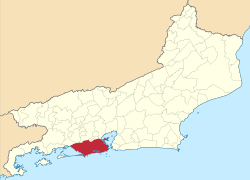Rio de Janeiro
Rio de Janeiro is the second largest city in Brazil. It is the capital of the state of Rio de Janeiro. Until April 21, 1960, it was the capital city of Brazil. According to the 2022 Census, the city had 6,211,223 people, and an area of over 1,000 km2. In 2021 Eduardo Paes became Mayor, having been mayor before in 2009 to 2017.[6]
Rio de Janeiro | |
|---|---|
| Municipality of Rio de Janeiro | |
Downtown Rio from Santa Teresa, with the Metropolitan Cathedral (center), Carioca Aqueduct (right) and Rio-Niteroi Bridge (background) | |
|
| |
| Nicknames: Cidade Maravilhosa (Marvellous City) Princesa Maravilhosa (Marvellous Princess) Cidade dos Brasileiros (City of Brazilians) | |
 Location in the state of Rio de Janeiro | |
| Coordinates: 22°54′40″S 43°12′20″W / 22.91111°S 43.20556°W | |
| Country | Brazil |
| Region | Southeast |
| State | Rio de Janeiro |
| Historic countries | Kingdom of Portugal United Kingdom of Portugal, Brazil and the Algarves Empire of Brazil |
| Settled | 1555 |
| Founded | 1 March 1565[1] |
| Named for | Saint Sebastian Guanabara Bay |
| Government | |
| • Type | Mayor-council |
| • Body | Municipal Chamber of Rio de Janeiro |
| • Mayor | Eduardo Paes (PSD) |
| • Vice Mayor | Nilton Caldeira (PL) |
| Area | |
| • Municipality | 1,221 km2 (486.5 sq mi) |
| • Metro | 4,539.8 km2 (1,759.6 sq mi) |
| Elevation | 2 m (7 ft) |
| Highest elevation | 1,020 m (3,349 ft) |
| Lowest elevation | 0 m (0 ft) |
| Population (2022)[2] | |
| • Municipality | 6,211,223 |
| • Rank | 4th in South America 2nd in Brazil |
| • Density | 5,174.6/km2 (13,402/sq mi) |
| • Urban | 11,616,000[needs update] |
| • Metro | 12,280,702[needs update] (2nd) |
| • Metro density | 2,705.1/km2 (7,006/sq mi) |
| Demonym | Carioca |
| GDP (PPP, constant 2015 values) | |
| • Year | 2023 |
| • Total (Metro) | $285.9 billion[3] |
| • Per capita | $23,700 |
| Time zone | UTC−3 (BRT) |
| Postal Code | 20000-001 to 23799-999 |
| Area code | 21 |
| HDI (2010) | 0.799 – high[4] |
| Nominal 2018 GDP (City) | US$ 93.9 billion (2nd)[5] |
| Per capita | US$14,046 (2nd) |
| Website | prefeitura |
| Official name | Rio de Janeiro: Carioca Landscapes between the Mountain and the Sea |
| Type | Cultural |
| Criteria | vi |
| Designated | 2012 (36th session) |
| Reference no. | 1100 |

History and geography
changeThe city was started in 1565. It is named for a river that does not exist after Portuguese explorers mistook an oceanic bay for a river.[7]
Copacabana Beach, Ipanema Beach, Sugar Loaf Mountain (in Portuguese, Pão de Açúcar), the statue of Christ the Redeemer (in Portuguese, Cristo Redentor), a harbor on Guanabara Bay, and Tom Jobim Airport are in Rio de Janeiro. It has much commerce and many industries, especially textiles, food, chemicals, and metallurgy. Most of these industries are in the northern and western suburbs of the city. Rio de Janeiro also has a small rural area, near the suburb of Campo Grande, where fruits and vegetables are grown.
Other cities near Rio de Janeiro, like Duque de Caxias, Nova Iguaçu, Queimados and São Gonçalo, that form the Metropolitan Region of Rio de Janeiro, also have a lot of industries and population.
The city hosted the Summer Olympic Games in 2016.
Geography
changeThe city is 420 kilometers (about 261 miles) away from São Paulo, the biggest city in South America. The cities of Rio and São Paulo are linked by the Presidente Dutra Highway (also known as Via Dutra). The region crossed by the Presidente Dutra Highway has been an important industrial zone since the 1950s.
In the city of Rio de Janeiro lies Tijuca National Park, created in 1961. This park contains some 33 km2, between the northern and the southern parts of the city. The district (in Portuguese, bairro) of Santa Tereza can be reached by taking an electric tram (in Portuguese, bonde) from central Rio de Janeiro (near Largo da Carioca subway station), crossing over the Arcos da Lapa, an aqueduct built during the colonial period to provide water to the city.
Sister cities
changeReferences
change- ↑ "Rio de Janeiro Info". paralumun.com. Archived from the original on 27 December 2008. Retrieved 6 August 2016.
- ↑ "Rio de Janeiro (RJ) | Cidades e Estados | IBGE". www.ibge.gov.br. Retrieved 2024-06-25.
- ↑ "TelluBase—Brazil Fact Sheet (Tellusant Public Service Series)" (PDF). Tellusant. Archived (PDF) from the original on 22 January 2024. Retrieved 2024-01-11.
- ↑ "IDNM Ranking" (PDF). United Nations Development Programme (UNDP). Archived from the original (PDF) on April 9, 2014. Retrieved August 1, 2013.
- ↑ "Gross Domestic Product of Municipalities". ibge.gov.br. Brazilian Institute of Geography and Statistics. Archived from the original on 5 November 2021. Retrieved 5 November 2021.
- ↑ "Members of the Global Commission | New Climate Economy | Commission on the Economy and Climate". Archived from the original on 2015-06-07. Retrieved 2015-06-22.
- ↑ "11 Fun Facts About Rio". Smithsonian Magazine. Retrieved 20 July 2024.
Other websites
change- Virtual photo tour through Rio de Janeiro and neighbourhood with www.riodejaneirophotoguide.com Archived 2012-11-25 at the Wayback Machine
- Prefeitura da Cidade do Rio de Janeiro Rio de Janeiro's City Hall. Includes statistical information about the city, about Carnival, and municipal laws. (in Portuguese)
- Rio de Janeiro at Wikivoyage










